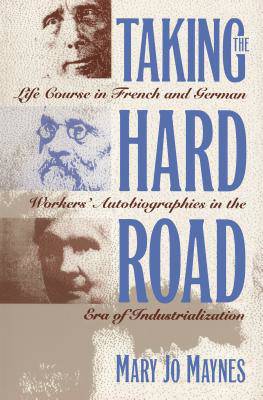
Door een staking bij bpost kan je online bestelling op dit moment iets langer onderweg zijn dan voorzien. Dringend iets nodig? Onze winkels ontvangen jou met open armen!
- Afhalen na 1 uur in een winkel met voorraad
- Gratis thuislevering in België vanaf € 30
- Ruim aanbod met 7 miljoen producten
Door een staking bij bpost kan je online bestelling op dit moment iets langer onderweg zijn dan voorzien. Dringend iets nodig? Onze winkels ontvangen jou met open armen!
- Afhalen na 1 uur in een winkel met voorraad
- Gratis thuislevering in België vanaf € 30
- Ruim aanbod met 7 miljoen producten
Zoeken
Taking the Hard Road
Life Course in French and German Workers' Autobiographies in the Era of Industrialization
Mary Jo Maynes
Paperback | Engels
€ 57,95
+ 115 punten
Omschrijving
Taking the Hard Road is an engaging history of growing up in working-class families in France and Germany during the Industrial Revolution. Based on a reading of ninety autobiographical accounts of childhood and adolescence, the book explores the far-reaching historical transformations associated with the emergence of modern industrial capitalism. According to Mary Jo Maynes, the aspects of private life revealed in these accounts played an important role in historical development by actively shaping the authors' social, political, and class identities. The stories told in these memoirs revolve around details of everyday life: schooling, parent-child relations, adolescent sexuality, early experiences in the workforce, and religious observances. Maynes uses demographics, family history, and literary analysis to place these details within the context of historical change. She also draws comparisons between French and German texts, men's and women's accounts, and narratives of social mobility and political militancy.
Specificaties
Betrokkenen
- Auteur(s):
- Uitgeverij:
Inhoud
- Aantal bladzijden:
- 278
- Taal:
- Engels
Eigenschappen
- Productcode (EAN):
- 9780807844977
- Verschijningsdatum:
- 22/05/1995
- Uitvoering:
- Paperback
- Formaat:
- Trade paperback (VS)
- Afmetingen:
- 156 mm x 236 mm
- Gewicht:
- 480 g

Alleen bij Standaard Boekhandel
+ 115 punten op je klantenkaart van Standaard Boekhandel
Beoordelingen
We publiceren alleen reviews die voldoen aan de voorwaarden voor reviews. Bekijk onze voorwaarden voor reviews.











